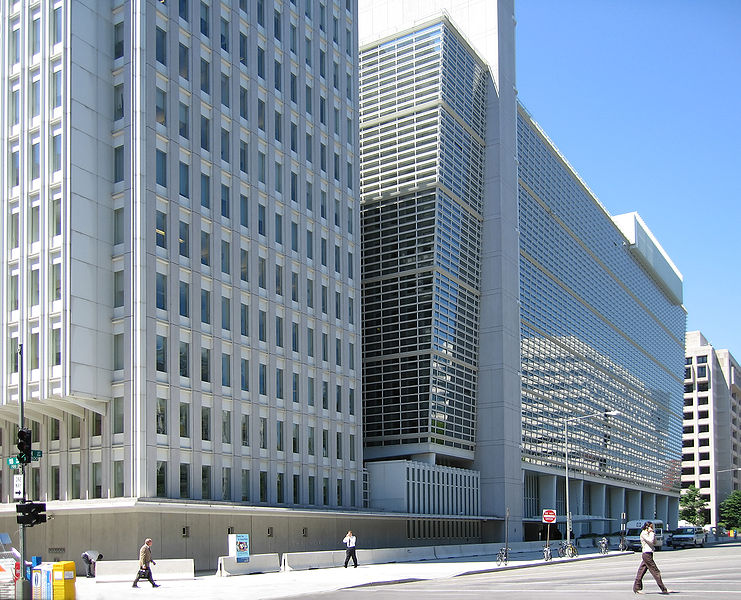
World Bank headquarters in Washington, D.C. Photo from Wikimedia.
The World Bank’s immunities were recently successfully challenged in Bangladesh by Ms. Ismet Zerin Khan, a former World Bank external affairs officer who alleged that she was illegitimately terminated in 2001.
According to a June 7 article in The Financial Express,Bangladesh District Judge Syed Mashfiqul Islam ruled that the suit should be “decreed against the defendant (World Bank) on contest” and found that “the termination was illegal, mala fide, arbitrary and that the Plaintiff is entitled to be reinstated in her post and get all arrear salaries and benefits.”
According to a 2005 story written in New Age Op-ed, Ms. Khan, who challenged the Bank’s decision not to confirm her probationary appointment on the grounds of abuse of discretion and failure to apply the Staff Rules, exhausted “all the internal administrative grievance recourses of the World Bank,” including the Appeals Committee and the Administrative Tribunal. However, “all efforts for a fair and just resolution of the dispute failed.” According to the article:
From an analysis of the Appeals process, it proved to be a biased and partial forum in favour of the Management where genuine redress of grievances of staff is not possible. Gross anomalies, irregularities and discrepancies are recorded in the Report of the Appeals Committee in reviewing Ismet’s Application.
In response to the Bank’s handling of the case, Judge Islam said that, “the World Bank as an employer doesn’t enjoy unfettered power regarding any suspension or dismissal of its employee and must follow rules contained in the Staff Manual of the bank.” To GAP’s knowledge, this is the first time that a judge has ruled that the Bank’s immunities do not allow it to arbitrarily violate its own rules or national laws with impunity.
According to The Daily Independent:
On the critical issue of immunity demanded by the World Bank, the court observed that “no Establishment Agreement existed between the World Bank and Bangladesh”.
It should be noted that after this suit was filed, the Bank reportedly pressed the Bangladesh government to sign such an agreement. Fortunately, protests prevented the government from giving in.
The judge also found that:
The “provision of immunity is in contradiction with the Constitution of Bangladesh”….. and that “immunity in this regard plays a role which is fundamentally opposite to the direction of the Constitution”. The court observed that “action can be brought against the World Bank” and “Section 9 of the Code of the Civil Procedure 1908 empowers a civil court to adjudicate any matter of civil nature of its jurisdiction”. According to the court document, “The International Financial Organisation Order 1972 is the one and only relevant document and guiding principle for the operation of the World Bank… which has the force of law in Bangladesh” and that “it does not grant immunity to the World Bank from judicial process in member countries”. The court has also determined that “the World Bank is not above the national laws; legal actions, if necessary, may be brought against the World Bank.”
Ms. Khan’s lawyer, Advocate Nurul Alam, said that he thinks the verdict “ended [the] World Bank’s immunity in the country.”
According to the New Age Op-ed, when The World Bank Administrative Tribunal reviewed Ms. Khan’s case in 2003, it provided a “suppressed and subdued Report,” but:
The extent of injustice and harm perpetrate (sic) by the Bank was so great, that it had to admit that ‘the treatment of the Applicant (Ismet) fell short of appropriate standards of justice which has effectively caused her harm…’ The Report further observed that the actions of the Bank ‘were not compatible with the guarantees of due process… [and that] … the Bank did not act with the fairness and impartiality which is called for in the Principles of Staff Employment.’
The Tribunal recommended that Ms. Khan be paid one year’s net salary and $10,000 in costs. However, the Tribunal failed to provide the requested relief: reinstatement.
This is one of many examples in which the Tribunal has failed to recommend reinstatement. In 2008, GAP prepared a preliminary review of Administrative Tribunal cases, and found that of the complainants who challenged termination successfully on due process or substantive grounds between 2000 and March 30, 2008, less than 15 percent were actually re-instated. The remaining 85 percent were dismissed from institutional employment despite prevailing. In fact, one of the major shortfalls of the Bank’s whistleblower policy is that it fails to guarantee whistleblowers employment/reinstatement when they successfully contest retaliatory dismissal.
Unless this decision is appealed, World Bank employees from Bangladesh who are denied impartial justice or reinstatement will now have access to national courts to challenge the Bank, a major advance. The Bank has not said whether or not it will appeal the decision to a higher court.
——————–
Shelley Walden is International Officer for the Government Accountability Project, the nation’s leading whistleblower advocacy organization.

